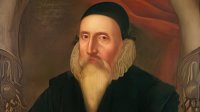John Dee was a prominent figure in the Elizabethan era and is known for his significant contributions as a mathematician, astronomer, occultist, and advisor to Queen Elizabeth I of England. Born on July 13, 1527, in London, England, Dee's interests and expertise spanned various fields, making him a versatile and multifaceted scholar of his time.
Dee's scholarly pursuits were wide-ranging, including mathematics, navigation, and astrology. He is often associated with the study of alchemy, hermetic philosophy, and the occult. Dee believed in the interconnectedness of the universe and sought to unlock the secrets of nature through the study of esoteric knowledge.
During his lifetime, Dee developed a reputation as a brilliant mathematician and astronomer. He advocated for the use of mathematics in navigation, which was instrumental in expanding England's maritime power during the age of exploration. Dee also worked extensively on calendar reform and published several influential works on mathematics and navigation.
In addition to his scientific pursuits, Dee was deeply interested in the supernatural and the occult. He believed that by communing with angels, he could gain access to hidden knowledge and divine guidance. To aid him in this endeavor, Dee employed scryers, individuals who claimed to have the ability to communicate with angels through various means, including the use of crystal balls or mirrors.
One of Dee's most famous scryers was Edward Kelley, with whom he conducted numerous spiritual and magical experiments. Together, they claimed to have communicated with angels and received information about a vast empire hidden within the Earth called the "Empire of Angels" or the "Empire of Ants." According to their accounts, this empire was inhabited by angelic beings who possessed advanced knowledge and technology.
Dee and Kelley believed that the angels wished to establish contact with humanity and impart their wisdom. However, the precise nature and existence of the Empire of Ants remain subjects of debate and speculation. Some interpret their interactions as genuine spiritual experiences, while others see them as products of Dee's vivid imagination or attempts to deceive.
Despite his contributions and intelligence, Dee's involvement in the occult brought him under suspicion and scrutiny from religious and political authorities of the time. He faced accusations of witchcraft and sorcery and was often viewed with suspicion. Towards the end of his life, Dee's fortunes declined, and he faced financial difficulties.
John Dee's legacy endures as a complex figure who straddled the worlds of science, mathematics, and the occult. He made significant contributions to various fields, and his pursuit of esoteric knowledge and spiritual communion with angels continues to intrigue scholars and occult enthusiasts to this day.
